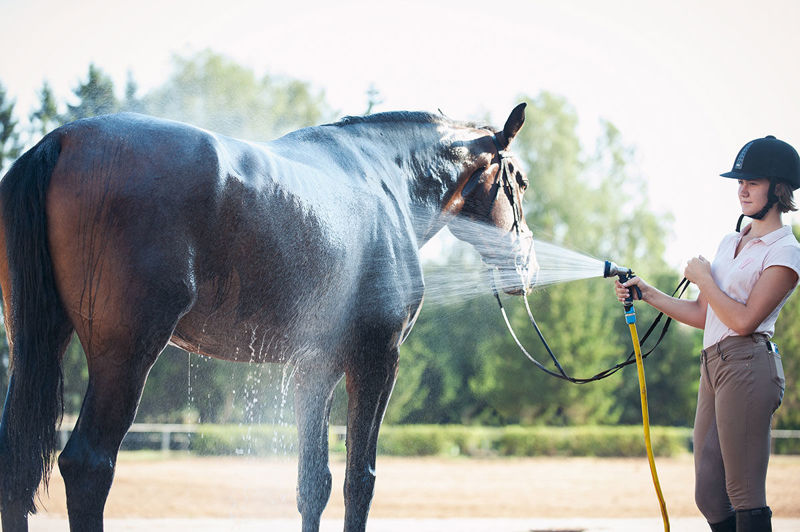Moving into summer means warmer and dryer weather and with this warm weather we need to be more mindful of keeping our horses well hydrated.
We only tend to worry about dehydration when the sun is shining and the temperatures are high however, even in overcast or rainy conditions, if the temperatures are creeping up dehydration can still be a risk for horses.
Water makes up over 65% of the horse’s body and this is influenced by temperature and exercise level. For horses working hard and in hot temperatures, their water requirements can increase by 300%. Whilst this is unlikely to be the case in the UK, it is important to recognise that your horse will require a higher water intake during warmer weather. An average horse will drink 6 – 10 gallons of water per day, however this can increase to 15 gallons per day or more if the horse is working.
Horses sweat to help them regulate their temperature and evaporation of sweat on the skins surface is responsible for up to 70% of heat loss during exercise. Horses can lose 3.2 gallons of water an hour through sweating as well as important electrolytes such as Sodium, Chloride, Magnesium, Potassium and Calcium. Horse sweat is hypertonic which means they lose more electrolytes than water. Without replenishing these losses horses will become dehydrated and this can affect performance and lead to electrolyte imbalances.
Signs of dehydration include:
- Decreased thirst response.
- Loss of skin elasticity.
- Dry mucous membranes.
- Dark coloured urine.
Dehydration can be prevented by:
Providing plenty of clean, fresh water and always allowing your horse access to water.
Feed salt on a daily basis as well as providing a salt lick.
Feed plenty of forage.
Cool your horse off after exercise
Provide your horse with shade.
Add electrolytes to their feed.
Fibre helps to trap water and electrolytes in the hindgut and provides a reservoir which the horse can draw on to help them combat dehydration, particularly during exercise periods. Different fibre sources will provide the horse with different amounts of water in the diet. Grass has a high moisture content of around 80% whereas hay can be as low as 15-20%. You will notice your horse drinking less water when turned out on fresh grazing, compared to when they are fed a mostly hay based diet.
Feeding salt is essential for replacing Sodium and Chloride. These two minerals cannot be provided by the diet, even via manufactured feeds as salt attracts moisture and will lead to the feed spoiling quickly. Sodium and Chloride as lost in the highest quantities in sweat, therefore feeding salt will help to replenish these losses. Providing a salt lick is great as this allows the horse to top-up on additional salt as required, however you shouldn’t rely on a salt lick to provide enough salt for your horse as their tongues are smooth and this means that they cannot gain enough salt from a salt lick to meet requirements.
How often should I feed electrolytes?
You don’t need to feed electrolytes every day, only when your horse is heavily sweating. This is because Magnesium, Potassium and Calcium are lost in much smaller quantities when compared to Sodium and Chloride. However, it is important to feed electrolytes when your horse has been sweating to ensure that their electrolyte balance is maintained. When horses drink water, this dilutes the electrolyte levels in their bloodstream. In turn this can ‘switch off’ the thirst response and lead to further dehydration. This is why it is important to feed electrolytes when needed, to maintain an optimal electrolyte balance.
When feeding electrolytes, it is important to ensure that they do not contain sugar or sweeteners as this leaves less room in the product for the important electrolytes, and therefore makes the product less effective. Look for an ingredients list that starts with Sodium chloride which is then followed by the other electrolytes Potassium, Calcium and Magnesium. If you are unsure, taste the product. If it tastes salty, then it will probably be a good one to use.
What do Feedmark offer as a solution to hydration?
Replenish™ is a balanced blend of the essential electrolytes Sodium, Potassium, Calcium and Magnesium, which are lost through sweat whilst exercising. Optimal electrolyte status is vital for peak performance, to maintain correct muscle and nerve function. Replenish™ is ideal for horses in hard work, or those who sweat a lot, to remain hydrated.


